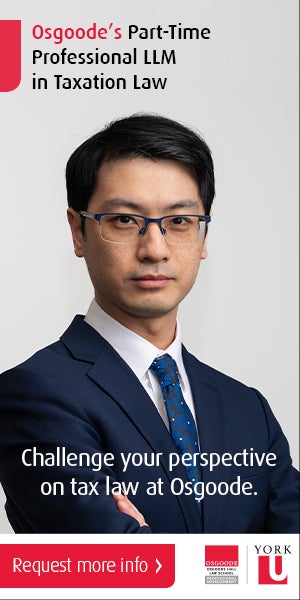A Canadian tax lawyer's perspective on income tax statute-barred periods

David J Rotfleisch on the timing legalities of reassessments
What is an income tax statute-barred period?
When taxpayers are initially assessed for income tax or GST, they are issued a "Notice of Assessment." Only one Notice of Assessment will be issued at a time per tax year or reporting period. If any changes need to be made to a prior tax assessment or tax reassessment, the taxpayer will be issued a "Notice of Reassessment" which effectively overrides any prior tax assessments or tax reassessments. A taxpayer may be issued multiple Notices of Reassessment for the same tax year or reporting period.
The Canada Revenue Agency ("CRA") has a prescribed period of time to reassess a given tax year or reporting period. This period of time is known as the ordinary or normal reassessment period. The length and start date of the ordinary reassessment period depends on whether the assessment is for income tax or GST/HST and it also differs for individuals and corporations. To issue a reassessment during the ordinary reassessment period, the CRA only needs to demonstrate a plausible error, even a minor one, with the taxpayer's tax reporting. Once the ordinary reassessment period has passed, the tax year or reporting period is considered "statute-barred".
The CRA can still reassess a statute-barred tax year or reporting period. However, to make such a tax reassessment the CRA must now demonstrate not only that the taxpayer made a reporting error but also that the error was caused by carelessness, neglect, wilful default or fraud on the part of the taxpayer. This additional requirement gives taxpayers an added avenue to prevent a reassessment. An experienced Canadian tax lawyer will argue that even if the taxpayer made an error, the error was not caused by carelessness, neglect, wilful default or fraud on the part of the taxpayer and thus no reassessment can be issued.
Since it is more difficult to successfully reassess taxpayers after the ordinary tax assessment period has passed, taxpayers are less likely to be reassessed or audited for tax years and reporting periods which are past the applicable ordinary reassessment period.
In College Park Motors Ltd. v. The Queen, the court explained the purpose of statute-barred tax years and reporting periods as follows:
It balances the need for taxpayers to have some finality in respect of their taxes for the year with the requirement of a self-reporting system that the taxing authority not be foreclosed from reassessing in those instances where a taxpayer's conduct, whether through lack of care or attention at one end of the scale, or willful fraud at the other end, has resulted in an assessment more favourable to the taxpayer than it should have been.
Statute-Barred Timing - Income Tax
Under section 152(3.1) of the Income Tax Act, the ordinary reassessment period is
- four years after the earlier of the mailing of the original notice of assessment or notification that no tax is payable for mutual funds and corporations which are not Canadian-controlled private corporations
- three years after the earlier of the mailing of the original notice of assessment or notification that no tax is payable for all remaining taxpayers.
Statute-Barred Timing - GST/HST
Under subsection 298 of the Excise Tax Act, the ordinary reassessment period is:
- For GST/HST, four years from latter of the deadline to file a return for a reporting period and the day the return was actually filed.
- For GST/HST rebates, four years from date of application for the rebate.
The ordinary reassessment period does not begin until the relevant return is filed.
Waiving of the Ordinary Reassessment Period for Income Tax
A taxpayer can choose to waive the ordinary reassessment period under the Income Tax Act explicitly by filing form T2029. This waiver can be rescinded. A taxpayer will generally file such a waiver where the resulting reassessment would give the taxpayer a benefit. For example, if a taxpayer discovers during a tax audit that he overstated income in a statute-barred year, he may waive the ordinary reassessment period to allow the auditor to adjust the overstated income downwards. The CRA may also attempt to argue the taxpayer implicitly waived the ordinary reassessment period as a means of allowing a tax reassessment beyond the ordinary reassessment period.
David J Rotfleisch, CPA, JD is the founding tax lawyer of Taxpage.com and Rotfleisch & Samulovitch P.C., a Toronto-based boutique tax law corporate law firm and is a Certified Specialist in Taxation Law who has completed the CICA in-depth tax planning course. He appears regularly in print, radio and TV and blogs extensively.
With over 30 years of experience as both a lawyer and chartered professional accountant, he has helped start-up businesses, cryptocurrency traders, resident and non-resident business owners and corporations with their tax planning, with will and estate planning, voluntary disclosures and tax dispute resolution including tax audit representation and tax litigation. Visit www.Taxpage.com and email David at david@taxpage.com. Photo David Rotfleisch courtesy Rotfleisch & Samulovitch P.C.







(0) Comments